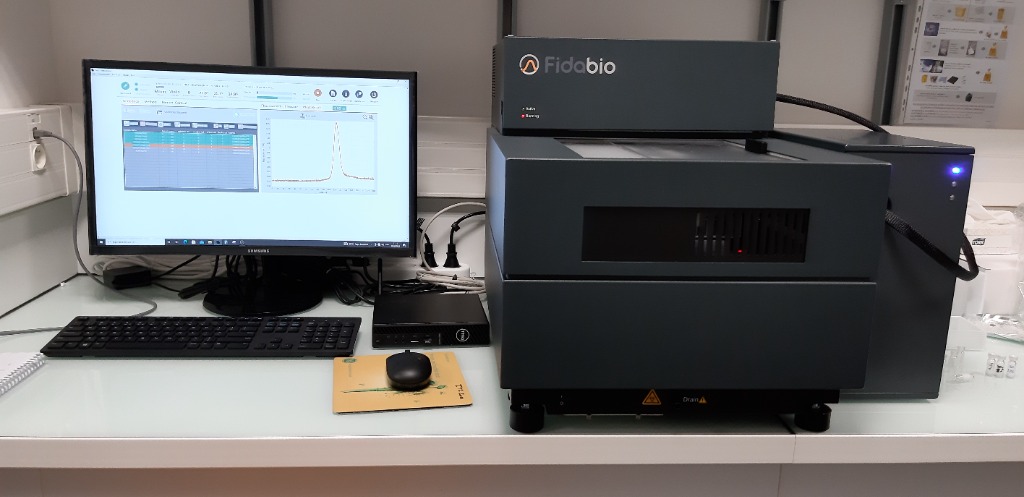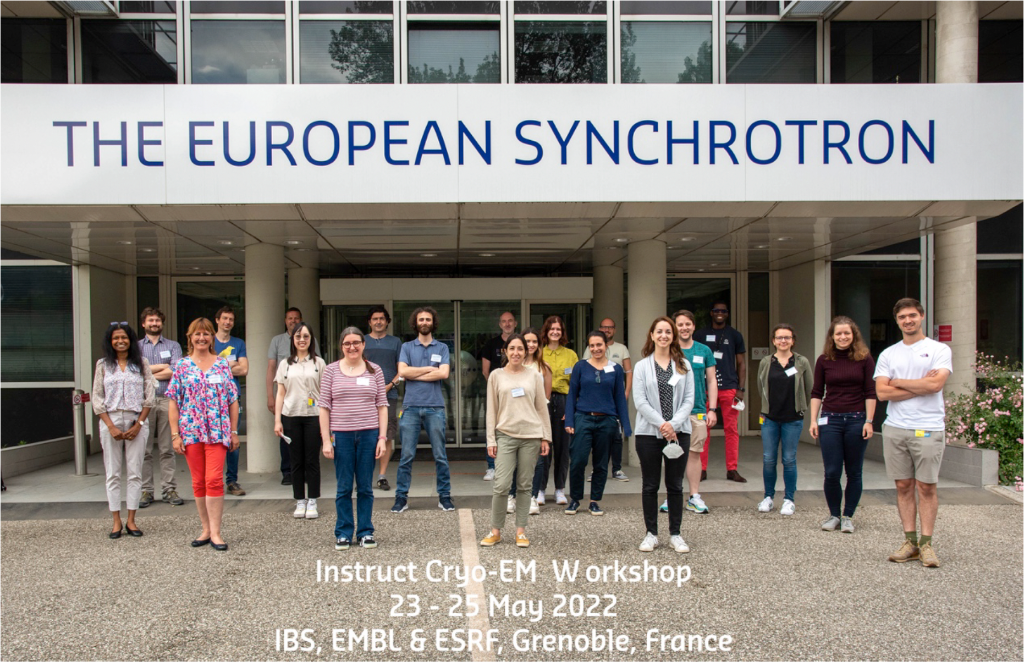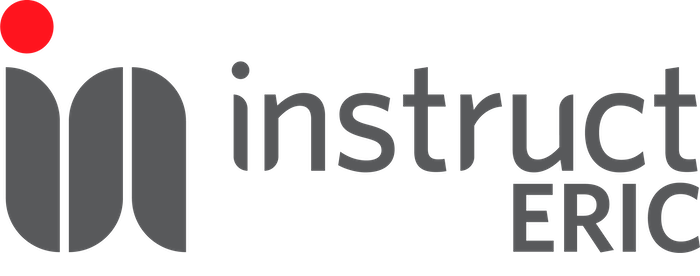France Annual Report Member Highlights and New Technologies
France has two centres in Instruct-ERIC; Instruct-FR1 hosted in Strasbourg at the IGBMC, and Instruct-FR2 in Grenoble at the IBS. Find out more about these centres and apply to access their technologies here.
The Instruct-Centre FR1 at Strasbourg hosted in the Center of Integrative Biology (CBI), located on the IGBMC site at Illkirch/ Strasbourg, which is also the coordinating Centre for FRISBI (French Infrastructure for Integrated Structural Biology), provides an integrated environment for structural studies of protein and macromolecular complexes. Its integrated structural biology platform offers project-based access to a large panel of tools from sample preparation (bacterial, insect and mammalian cell expression systems), purification and biophysical characterisation to three-dimensional structure determination using cryo-EM (our flagship for Instruct- ERIC), X-ray crystallography, small angle X-ray scattering, NMR of proteins and macromolecular complexes including nucleoprotein complexes.
Instruct Centre France 2 in Grenoble provides supported user access to some of the highest-level structural biology instrumentation in France. Our platforms are located at the Institut de Biologie Structurale (IBS) with user access managed by the Integrated Structural Biology Grenoble (ISBG) service unit.
Technological Advances
Instruct-FR1
The platform provides access for a new and unique tool in Instruct, gene tagging with the CRISPR-Cas9 system for introduction of affinity tags to facilitate the purification of endogenous complexes or for tagging proteins with fluorescent reporters in view of imaging and functional proteomics applications, in the frame of a partnership with the TacGene platform from the Museum d’Histoire Naturelle (Paris, France).
Gene Tagging
In Molecular Biophysics, the centre offers a unique and new technology, FIDA which combines Taylor dispersion analysis (TDA) and fluorescence detection in straight fused silica capillaries to measure biomolecular size, enabling accurate determination of hydrodynamic radius (Rh) and size-based characterisation of biomolecular interactions. Measurements using Fida1 can be performed in plasma, serum, cell lysate and fermentation media.

Equipment for Flow-Induced Dispersion Analysis (FIDA)
Instruct-FR2
In 2022, two NMR spectrometers have been upgraded: The flagship high field 950 MHz instrument has been upgraded with a new Bruker NEO console, and the cryoprobe for high-sensitivity solution NMR will be replaced in spring 2024. The Agilent 600 MHz solution NMR instrument has been upgraded by replacing the 20-years old Varian VNMRS console with a refurbished Bruker Avance IIIHD console, and a new cryoprobe will be installed in July 2023. We also have setup a portable in-situ NMR sample illumination device compatible with all our NMR instruments. This equipment, currently equipped with 3 laser sources (405 nm, 488 nm, and 561 nm), is available to Instruct users. By coupling NMR spectroscopy with light, it is possible to perform multidimensional NMR measurements under in-situ illumination, providing information on light-induced chemical and structural changes in photo-sensitive, photoactivatable, or photo-commutable (bio)molecules. Finally, we have extended our popular pulse sequence library NMRlib-2 that allows users to easily setup many biomolecular solid-state NMR experiments.
A new SAFe360 microscope from Abbelight and Olympus (SR-M4D) was purchased for the FR2 imaging platform in 2021 and during 2022 has been implemented to reinforce the super-resolution capabilities of the platform (PALM/ STORM/ PAINT and single particle tracking), together with our home-built system (PALM-M4D) that is also constantly evolving (last upgrade 2023). Both systems are based on the single molecule localisation microscopy (SMLM) method, and are adapted for 2D/ 3D-astigmatism and multicolour high-resolution imaging. While the SAFe360 microscope has additional features such as supercritical-angle-based 3D reconstruction, spectral demixing, large-field homogeneous excitation (ASTER™) and real-time image reconstruction, the home-built super-resolution microscope allows more precise laser control and use of complex laser sequences through the Labview interface for single-molecule and photophysics-oriented studies. Importantly, on this microscope, development of cryogenic SMLM is being carried out, notably in view of future cryo-CLEM experiments. We demonstrated that a UV-laser at 355 nm improves labelling efficiency in cryo-PALM as compared to the classical 405 nm activation laser used at room temperature.
France Structural Biology Activites
National roadmap for the equipment of France in cryo electron microscopy.
The project EquipEx+ France-Cryo-EM was funded for the equipment of France in 3 cryo electron microscopes of 300kV, two of which are for installation at Instruct centres in Grenoble and Strasbourg, and one at SOLEIL, Paris-Saclay.
The first equipment Titan Krios G4 with E-CFEG, Selectris X, Falcon 4i was delivered in August 2022 at FR1 centre and will be open for user access in 2023. These will provide access to national users for single particle experiments and, soon, cryo-ET with an accompanying financing of cryo-FIB in progress.
Organisation of 6th FRISBI users meeting held 6 December 2022 at CNRS Campus Gif/Yvette, France.
This meeting brought together 90 participants from the national community of structural biology. FRISBI users were invited to present their results following access to the FRISBI platforms and the opportunity to exchange with the French structural biology community.
Training
4th Instruct-ERIC Hands-on workshop on sample preparation for Single Particle cryo-EM
Date: 23-25 May 2022 Grenoble
This biannual practical workshop has taken place since 2018 at the European Photon and Neutron Campus (EPN) in Grenoble, France. Four local institutes, the European Synchrotron (ESRF), the French Institute de Biologie Structurale (IBS), the European Molecular Biology Laboratory (EMBL Grenoble) and the Institut Laue Langevin (ILL) as well as an instructor from the microscope manufacturer ThermoFisher provide a theoretical background on and practical hand-on instructions of sample preparation for single particle cryo electron microscopy (cryo-EM). The course is intended to give scientists at all stages of their career the opportunity to get an intense hands-on experience on the optimal preparation of sample grids. An ever-increasing number of applicants clearly shows the demand for this training. The practical workshop had 12 participants selected from over 70 applications and half of them opted to bring their own protein samples.

Instruct sample preparation for Single Particle cryo-EM Workshop
Instruct Practical School on Advanced Isotopic Labelling
Date: 16 to 23 September 2022
Biomolecular NMR spectroscopy provides invaluable insights into macromolecular structures, dynamics and interactions. Such studies require the production of macromolecules (proteins or nucleic acids) that have been enriched with NMR-visible stable isotopes. Recent advances in isotopic labelling techniques have allowed increasingly complicated biomolecular systems to be investigated by NMR spectroscopy, such as applications to biological machineries with molecular weights exceeding 1 MDa, large ribonucleotide particles and complex membrane protein systems. Many isotopic labelling schemes and methodologies are available and the choice of the optimum strategy depends greatly on the system being studied and the question being asked. This Instruct Practical School has provided both practical and theoretical training in state-of-the-art isotopic-labelling approaches for NMR studies. The participants gain hands-on experience in a broad range of labelling methods, including innovative protocols for specific labelling, segmental labelling and in vitro expression of RNA and proteins. The 16 participants were encouraged to bring their own protein and/or RNA constructs for use in practical demonstrations. The School provided an environment in which attendants were able to exchange practical experience on protein labelling with instructors and other participants. This lab-based training course was held at the IBS in Grenoble, Instruct Centre France 2.

Advanced Isotopic Labelling Workshop
10ième Ecole de Biologie Structural Integrative
https://ecolebios2023.sciencesconf.org/
This annual school offers theoretical and applied training in the different approaches used in structural biology (X-ray diffraction and scattering, NMR, cryo-microscopy, preparation of samples for structural studies, macromolecular interactions).
